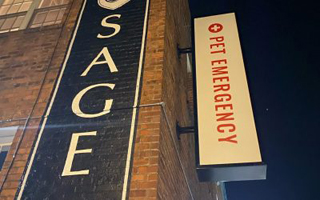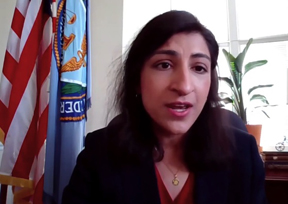Consolidator divests six veterinary hospitals after regulator intervenes in Sage deal
Safe SF

Sage Veterinary Centers photo
Sage Veterinary Centers owns specialty and emergency hospitals in the United States, including this one in San Francisco, which officially opened its doors in November. NVA, owned by German private equity firm JAB, agreed to acquire Sage last year when it had 16 hospitals. It has since been ordered by the Federal Trade Commission to sell six hospitals due to competition concerns.
Large corporations that want to keep acquiring specialty and emergency veterinary hospitals in the United States appear to be running out of headroom.
Concern that ownership has become too concentrated has prompted the Federal Trade Commission to order National Veterinary Associates (NVA) to sell six such hospitals — three in California and three in Texas.
The magnitude of the intervention, announced this month, is significant. NVA had agreed to assume ownership of 16 hospitals through a $1.1 billion acquisition of Sage Veterinary Centers, announced last year. The order means NVA is parting with more than one-third of the number of assets it had intended to obtain from the deal.
The six hospitals, all being sold to Florida-based United Veterinary Care, comprise three Sage clinics in Austin, Texas; and three other clinics, located in San Mateo, Berkeley and Fairfield, California.
The focus turns now to how the FTC will treat NVA's acquisition of Ethos Veterinary Health, which owns 23 specialist and emergency hospitals in the U.S. That deal was made public last August, about two months after the Sage acquisition was announced.
Regarding Ethos, FTC spokesperson Betsy Lordan said the regulator doesn't comment on whether it may take action pertaining to particular deals. It makes a public announcement only if and when it takes action, she said. NVA spokesperson Laura Koester didn't comment on the Ethos deal and would only refer the VIN News Service to a press release issued by NVA on June 3 stating that the acquistion of Sage had been completed.
The FTC move on the Sage deal marks the third time since 2017 that the regulator has intervened in a takeover of veterinary hospitals. In the first instance, Mars Inc. agreed to sell 12 specialty and emergency centers to gain approval for its $9.1 billion acquisition of VCA. In 2020, JAB agreed to divest three specialty and emergency centers to win approval for its merger of NVA with Compassion First.
On this latest occasion, the FTC has added strictures that it didn't on the previous two. NVA's owner, JAB, must now obtain the regulator's prior approval before acquiring a specialty or emergency veterinary clinic within 25 miles of any JAB-owned clinic in California or Texas. Also, JAB must notify the FTC before acquiring any specialty or emergency veterinary clinic within 25 miles of a JAB-owned clinic anywhere in the U.S.
Monitoring how many practices are being snapped up by consolidators can be tricky because they often are private companies that don't have to disclose acquisitions publicly — a situation the FTC found unsettling.
"Private equity firms increasingly engage in roll-up strategies that allow them to accrue market power off the commission's radar," Holly Vedova, director of the Bureau of Competition, said in a statement. "The prior notice and approval provisions will ensure the commission has full visibility into future consolidation and the ability to address it."
The FTC decision ordering NVA to sell the six hospitals was unanimous, with all five members — three Democrats and two Republicans — voting in favor. Still, there was some disagreement over the reach of the agency's intervention.
The two Republican members, Christine S. Wilson and Noah J. Phillips, contended that the deal only lessened competition in certain local geographic areas and that the additional strictures imposed by the FTC were unnecessary. The FTC's Democrat majority had an "evident distaste for private equity as a business model," they claimed.
For her part, FTC Chair Lina Khan, a Democrat, said the Republican members' criticism is "belied by both market realities and prevailing law," noting that NVA has been acquiring veterinary clinics across the U.S. The company, which is the world's third-biggest consolidator behind Mars and Britain's IVC Evidensia, owns more than 100 speciality and referral centers in the U.S. and more than 1,400 veterinary clinics globally, according to its press releases.
Scene set for more regulatory intervention
Given that roughly 75% of specialty and emergency clinics in the U.S. are owned by corporate consolidators, by the reckoning of Chicago-based animal health firm Brakke Consulting, the FTC's intervention didn't surprise Brakke analyst John Volk. At the same time, he wasn't expecting the FTC to order the divestment of such a large number of practices. "The number surprised me a bit," Volk said.
Lina Khan

Screenshot from Federal Trade Commission video
Lina Khan, chair of the Federal Trade Commission, has expressed concern about the rising market power of private equity firms in the veterinary realm.
As for general practices, consolidators own roughly 25% of clinics in the U.S. — larger practices, for the most part. Brakke estimates that just under 50% of all revenue from U.S. veterinary hospitals is controlled by consolidators.
Whether the FTC will more closely scrutinize deals in general practice remains to be seen. In the United Kingdom, a market with a level of consolidation similar to the U.S, its antitrust regulator has this year effectively blocked two deals involving general practices.
At least one investment banker suspects the FTC's intervention in the Sage deal portends a crackdown across the entire U.S. veterinary industry.
"We feel this is evidence that industry consolidation has reached a tipping point wherein the perceived long tail of independent veterinary clinics is no longer a sufficient cleansing mechanism around the issue of antitrust," said Bryan Jaffe, a managing director at Seattle-based investment bank Cascadia Capital.
By "long tail of independent veterinary clinics," Jaffe is referring to a tendency for consolidators to argue that there are a sufficient number of independent practices left to prevent their acquisitions from being anti-competitive.
"All signs are that more merger scrutiny is forthcoming," Jaffe said.
Correction: This story has been changed to indicate that of six practices NVA must divest, only three are Sage clinics. The remaining three are other NVA clinics.